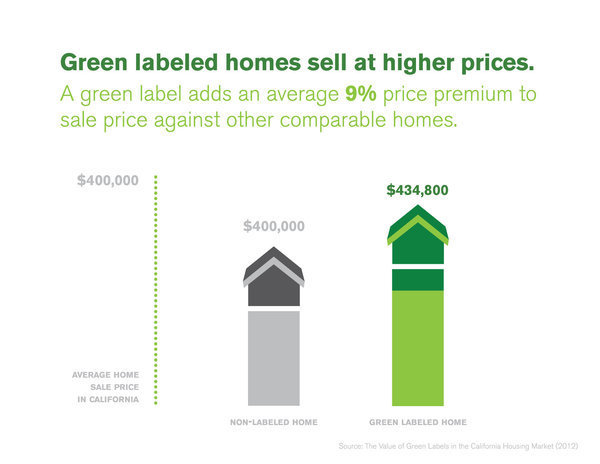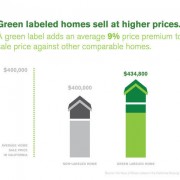More Evidence of Green Value
A recent analysis of homes done by UCLA Berkley researchers found that a green labeled home (LEED for Homes, NAHB Green, Energy Star, etc) had a mearurably higher value than non-green (standard) homes.

Researchers from UC Berkeley and UCLA have found that green home labels typically add almost 9% to the value of a California home.
The “Value of Green Labels in the California Housing Market” study found that a typical California home valued at $400,000 sells for an average of 8.7%, or $34,800, more when it has a green certification label.
The study was conducted by researchers with UC Berkeley and UCLA who hoped to answer the question: Does the investment in an energy-efficient home pay off during resale? The short answer is yes.
According to the study, price premiums resulting from green certification were closer to 12% in hotter parts of the state. It also found the premiums were strongly correlated with an area’s environmental ideology as measured by the number of hybrid vehicle registrations — a phenomenon dubbed “the Prius effect” by visiting UC Berkeley professor Nils Kok, who led the study.
Take the next step!
offers full day courses to learn how you can affordably earn third-party certification on your next project:
August 8 in Chicago
September 11 in East Lansing, MI
Oct 24 in Ann Arbor, MI
Oct 24 in Batavia, IL
Just as “people sometimes buy a Toyota Prius not just because of the fact that it’s more efficient but because of environmental virtue,” Kok said, “people might buy a green home because of ideology. In areas where the penetration of hybrid vehicles is higher, we find the premium paid for green homes is higher as well.”
Even though buyers of green homes were likely to save an average of $700 in energy bills annually, “consumers value aspects other than just energy savings alone when purchasing a green home,” said Kok, who cited intangibles such as enhanced indoor air quality and better insulation.
The study estimated that the cost of making a home 35% more efficient was $10,000, “so the benefit of green homes far outweighs the cost,” Kok said.
Green home labels seem to be increasing in value. Kok noted that green-label homes sold in the latter part of the five-year study period “seemed to have gone up relative to the beginning of the sample period.”
What about areas outside California? Well increasingly as more regional areas add green MLS fields that support identification of green home features, it is becoming easier for real estate appraisers to identify the local impact on market value. Learn more at our Green Real Estate Toolkit.
Reprinted from LA Times Article
